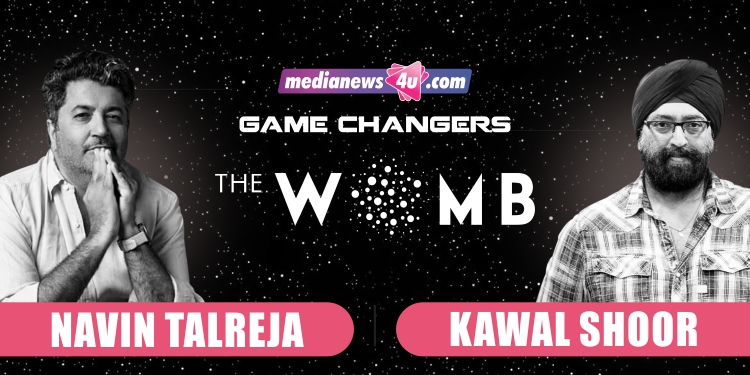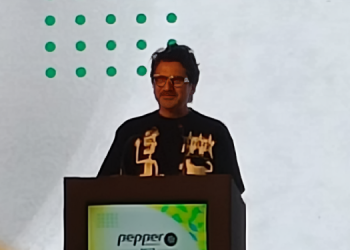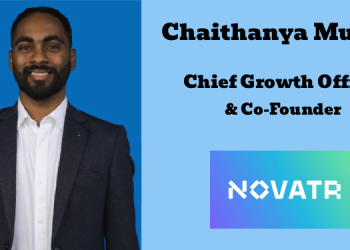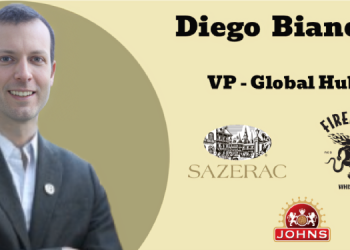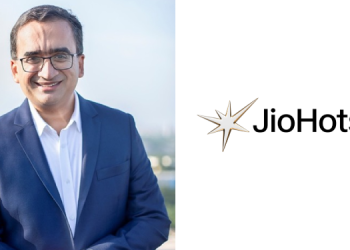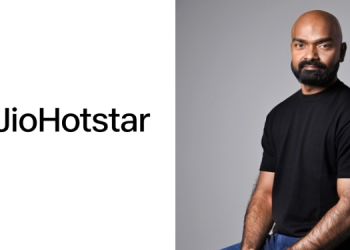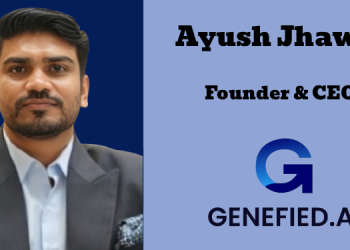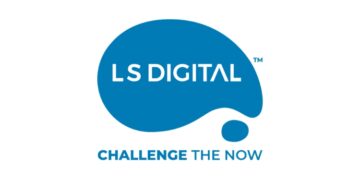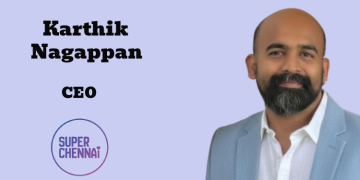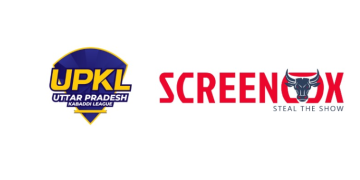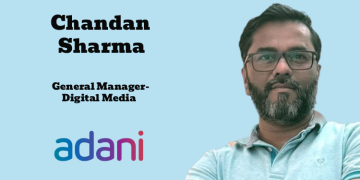“If you don’t put a date to it (starting an agency), you will never quit,” said the first client The Womb worked with even before the agency was born. Those were the words of Darshan Patel of Vini Cosmetics (Fogg). Soon Saregama headed by Vikram Mehra, a client when he ran marketing at Tata Sky, followed.
“We are both middle class guys with not too many needs. Then there was another person who joined us. The fee from two clients, for the three of us, was fairly large. It was far bigger than the salaries we were drawing (earlier). Because we had two clients and not too many costs, we could go about building the business the way we wanted to,” recalls Kawal Shoor, Planner and Founding Partner at The Womb.
Shoor and the other Founding Partner of the agency Navin Talreja, the Business Head, spoke with MediaNews4u.com’s Consulting Editor Gokul Krishnamoorthy from Australia over a video call. After seven and a half years, numerous awards including the most recent Apac Effie ‘Independent Agency of the Year’ and Bronze ‘Agency of the Year’ 2022, the duo were deservedly working from down under around the ICC Men’s T20 World Cup knock-outs.
It’s a pity India made an exit in the semi-final. The Womb, on the other hand, is on a very strong wicket. And playing on its own terms.
From three people, the count stands at over 84 today and from two clients the number is up to 22. But it is not about the number of clients. The disruptive nature of the work that the agency has come up with, from Saregama’s product innovation Carvaan to the category-challenging Sebamed to the most recent campaign for TrueCaller, among others, is amazing in its consistency.
‘Do good work, the clients will come’
The duo talked us through the early days. Though the cash flows were more than copious, the founders did not take a salary for the first 18 months. The money was invested back in building the teams. ‘Kya chal raha hai?’ for Fogg clicked in year one for the brand. A year and a half or so later, Saregama Carvaan re-energised the legacy music label and revolutionised the category.
Work for MPL and upGrad also brought on the smiles and laughs. Good, old-fashioned advertising that cut through the clutter. Sometimes with humour, often with shock value. But always rooted in insight.
A humble and pragmatic Shoor calls the growth a combination of skill and luck. “In a short span of time, we had two solutions that would set the template for the company we were about to create. If everyone is dressed in black at a party and there comes a guy in a red leather jacket and red shoes, he naturally attracts the people who want to be like that. We naturally attracted the kind of clients who were attracted to the kind of work we were doing,” he explains.
The agency decided not to pitch and that did pose ‘some challenges’ in the first 18 to 24 months, admit the ex-Ogilvy hands. But after that, as they term it, it became a ‘virtuous cycle’. The clients who wanted work ‘like Fogg’ or ‘like Carvaan’ gravitated towards The Womb.
“And then we started focusing like crazy on the output,” says Shoor.
“And we continue to,” adds Talreja.
The duo credit the approach to (late) Ranjan Kapur, former WPP India chairman and Piyush Pandey, who helmed Ogilvy after Kapur: ‘Do good work, the clients will come’.
“When we say we don’t do pitches and that clients will come when we do good work, people think we are being supercilious about it. Look at any creative field. Look at an artist. If s/he creates a great painting, more people will want to buy more of their art. If someone creates a great film, they will get more work. In any creative field, your output has to be great for you to be wanted,” emphasises Talreja.
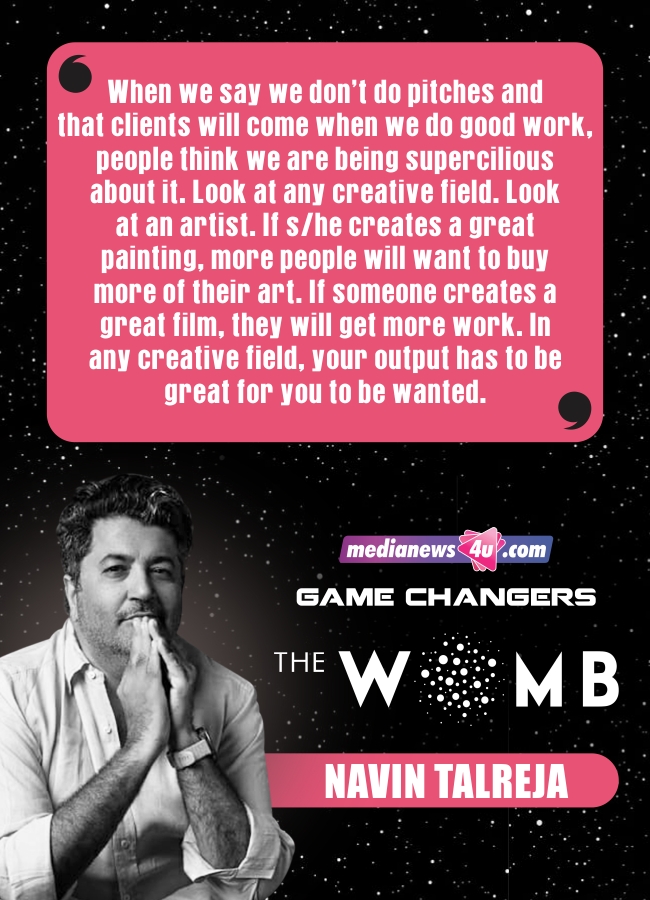
“It’s fairly linear. Whenever good work has gone out, it is immediately followed by new business conversations. When more work goes out, more conversations happen,” he adds.
In its early stages, The Womb was known as ‘the Fogg and Carvaan agency’. Two years into its existence, the founders made a conscious effort to shake off that tag. When work on Sebamed and UpGrad went out, clients started asking for ‘Sebamed’ and ‘UpGrad’ kind of work, reveals the business head, who incidentally has also featured as a model in a few of the ads done by the agency.
It’s not difficult to understand or believe that clients do want work that stands out. The word spread.
Bhaskar Choudhuri, APAC CMO at Lenovo, used to work at Cadbury in an earlier role – he was a client of Shoor’s then. The Womb was called in to do a corporate campaign. Amit Doshi, who headed Lenovo India when that campaign was made, moved back to Britannia. He reached out to The Womb wanting them to work on a few brands.
“When a client believes that we can solve their problem, then pitches become very trivial. Work on Pure Magic and Bourbon will go out very quickly. There’s a third brand that we are starting work on. So there are two pathways to growth that we have seen,” notes Shoor.
While that may be the case, working without pitching while staying with clients who are aligned to a certain kind of work, could scale be a challenge? The founders admit that it could, but point out that there are different pathways to scale, too.
“We don’t want to be a WPP or an Omnicom. We just want to do good work and be fairly tight in our size because then we can keep an eye on all the work we are doing,” responds Shoor.
“It can limit you in terms of scale, unless you find other ways of scaling. There is the network way of scaling, where the top management becomes more and more removed from work. If the second and third line have not been trained enough then there is a lot of generation loss in quality. What we are trying to do, is think of it more like a law firm than an ad network. You have individual partners or groups who are well trained and given smaller or specific jobs or a job for a small duration. So if you are working with a law firm that is well known, the client knows that the lawyers handling your case will bring the best of that law firm to you. Which also means that you scale – but you scale very slowly,” explains Shoor.
The duo consider themselves lucky that ‘most’ of the team has been with The Womb for ‘most of its journey’. The top six or seven have spent more than five years at the agency.
“They are fairly unrecognisable from the time they joined us to now. We’d also like to get them out there – it’s not just the two of us creating all the work,” avers Shoor.
If there was one job and 100 units of work to be done three years ago, the founders would have been involved in 70 or 75 of those units. With the trickle down of the work philosophy – that it needs to be ‘simple yet unignorable’ – today the founders say they get involved in just 40 units of that work.
“Maybe in a year or so we will be involved in 30 units. The quality doesn’t suffer because you come in at the right time, whether it is at the beginning, middle or end of that job. Coming to scale, it depends on how much you want to grow every year. 100 percent? 50 percent? As long as the quality of the output doesn’t drop, I think 30 or 40 percent is very healthy,” underlines Talreja.
The Value System
The stated values that drive The Womb Communications are integrity, empathy and imagination (as against creativity). This is articulated rather well on the company’s website and a lot of the disruptive work seem to have roots in each of these. Were these values honed along the journey?
“This has been in the making since our Ogilvy days. As they say, for every solution you need a problem. For every value you need a conflict. Values shine through best when they are conflicting with some things. A person is not honest until that person is given an opportunity to cheat. Empathy, integrity, imagination – they all came from everyday work situations. Often you see values articulated by companies that are nice to read and nice to see. Ours came from everyday life,” reflects Shoor.
Empathy, be it towards clients, consumers, partners or the team members, is the starting point, he notes, adding that integrity as a value needs to be ingrained beyond business. Within the business, there are many areas where integrity becomes important. Some more obvious than others.
“You have heard of a lot of dealings that go around when it comes to production houses. There is no smoke without fire. You don’t know where the fire is or how big it is, but you can clearly see the smoke,” he says.
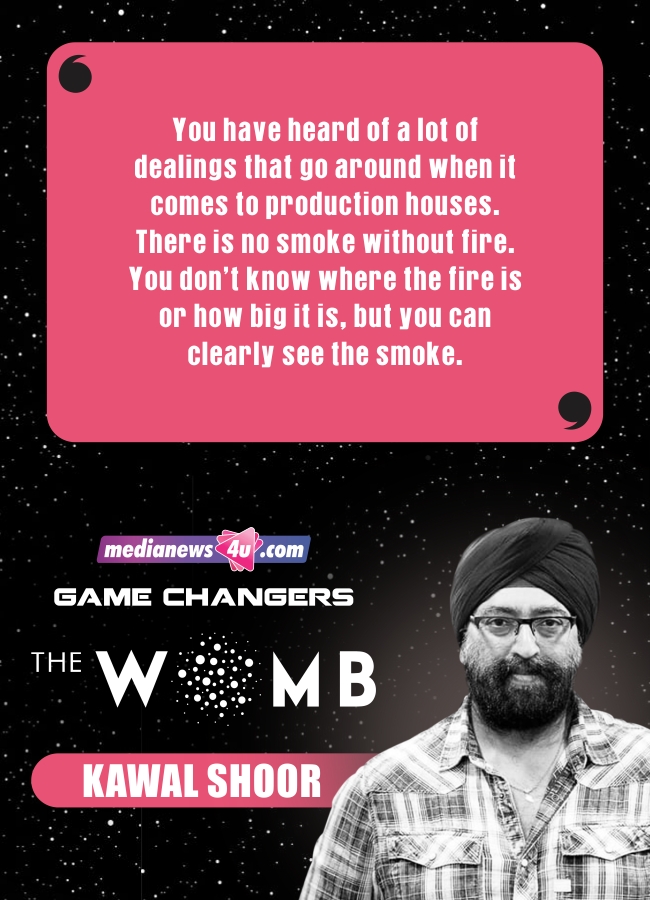
“We’ve made it clear to the team that if we are going to give a job to a production house, it will be because they are the best guys to do that job. When it comes to pitches, do you really think an agency can solve a problem that the client has been grappling with for months or a year, in 15 days? If I had to put my money on a solution that I give a client, would I? That’s the question we put to ourselves when we suggest a solution,” explains Shoor.
A lot of the successful work from The Womb, like the Saregama Carvaan product innovation, work on Sebamed and Fogg, among others, have not come from people in the ‘creative’ department, says the co-founder. They have come from people with ‘a little bit of imagination’. Hence ‘imagination’, as against the more limiting ‘creativity’ that has typically been the driver for agencies.
Admittedly, these values are simple, but not easy to do. One senses that staying true to them has helped The Womb get to where it is today.
“Have we gotten tempted in these seven and a half years to do a pitch? Yeah. But a principle is a principle only when it is tested. When you are tested and you stick with them, then you know you are living by those values,” reveals Talreja.
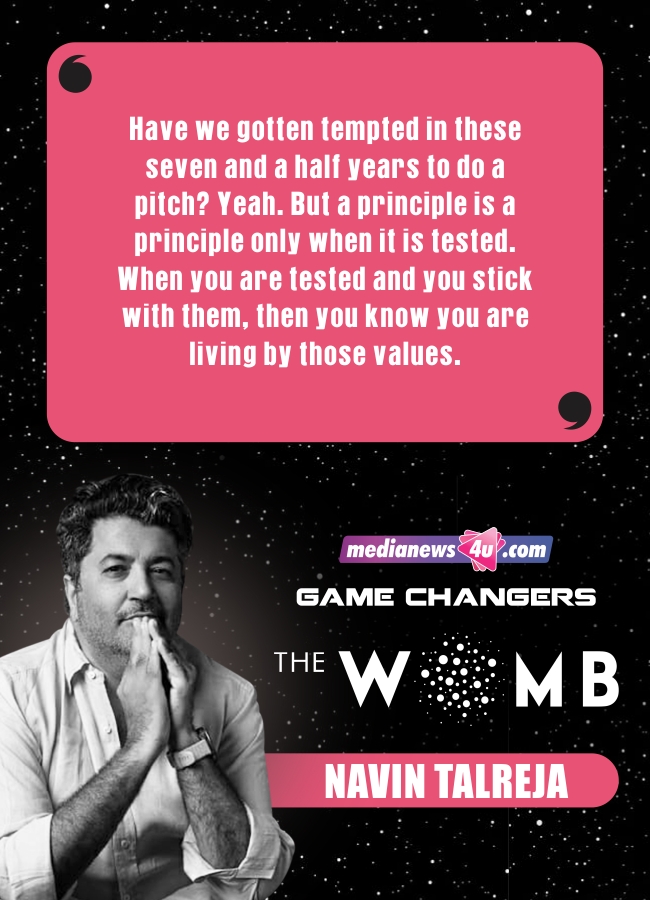
During the Covid years of 2020 and 2021, the agency claims to have doubled its business.
“No client of ours cut fees. No client delayed payments. We didn’t let go of people. We didn’t cut salaries. I think it was the integrity that was rewarded by some higher power that we doubled in the Covid years. Otherwise, we have been growing at 25 to 30 percent every year,” he reveals.
“With a better than industry bottomline,” adds Shoor.
That has been helped by the premium the agency claims to be able to command in the market.
“If you are not able to command a premium, then the work is great only in your head. Any superior product has the ability to command a premium. I don’t think we need to be apologetic in asking for more money. There will be enough people willing to pay for good work,” says his partner.
What Next?
It’s been a dream run, but what next? Pose the question and Shoor says that the two don’t plan too much.
Talreja follows suit: “Just the next good work. Just an hour ago we were excited by Britannia and a couple of campaigns that are coming out. By January we will be excited about the work coming out then. That’s how the eight years have gone by.”
Shoor gets a little philosophical while pondering on the question. He says, “At our age, if an idea still energises you, you’re still fit for this business. The day a great idea does not fill you with excitement, is the day you should leave.”
He narrates cricketer Adam Gilchrist’s decision to retire after dropping a catch and not feeling terrible about it that night.
“We are not the kind of guys who will hang around to do management,” says Shoor.
Mulling over ‘What next?’ Talreja comes back with a deeper thought. “There are some things which are not right in the industry. Pitching is one. We have taken a stance (not to pitch). We would like to take the lead to change a few things, for the better hopefully, if that’s what we do for the last five or 10 years of our working life.”
Among issues are pitches and IPs. Talreja cites the case of a project executed for a client. The agency gets paid, but when it comes to repeating the work the next year, the production house gets paid a royalty but the agency gets nothing. Shoor says someone needs to ‘bell that cat’. While acknowledging that it cannot be done alone, he makes the point that someone has to start the process of change.
Says Talreja, “We are quite happy to be called the bad boys of advertising who call out the b*** ****.”
Among things that also need change are the way agencies are compensated, according to the founders. “We’ve got a long way to go (on that front),” says Shoor.
A top consultancy would charge four times the per-hour cost what the ad agency charges (industry average), adds Talreja.
Whether it is contracts, compensation or the ability to present one’s point of view, it all stems from equality between client and agency, which many agencies have compromised on, they point out.
Shoor also refers to agencies’ obsession with areas like digital and Meta and the next emerging platform or touchpoint, which are not the biggest concerns of the client – the business problem is the biggest concern, he reminds us. Unless an agency positions itself as a solver of the client’s problems and actually does that job, it has little scope for moving up the value chain, is his contention. It’s hard to disagree with that observation.
Effectiveness Scams
One more thing they would like to see change is the way effectiveness awards are judged. Like creative scams, there are effectiveness scams today across award shows, points out Shoor.
“How do you award Gold to a two-day activity that changed the brand’s fortunes for a year? How can a Grand Effie be given when it has not resulted in business growth, and just built some affinity for the campaign – and not even the brand? There’s a huge problem in how effectiveness gets defined and it’s pulling our industry down massively,” says Shoor, who has served on many international effectiveness awards juries.
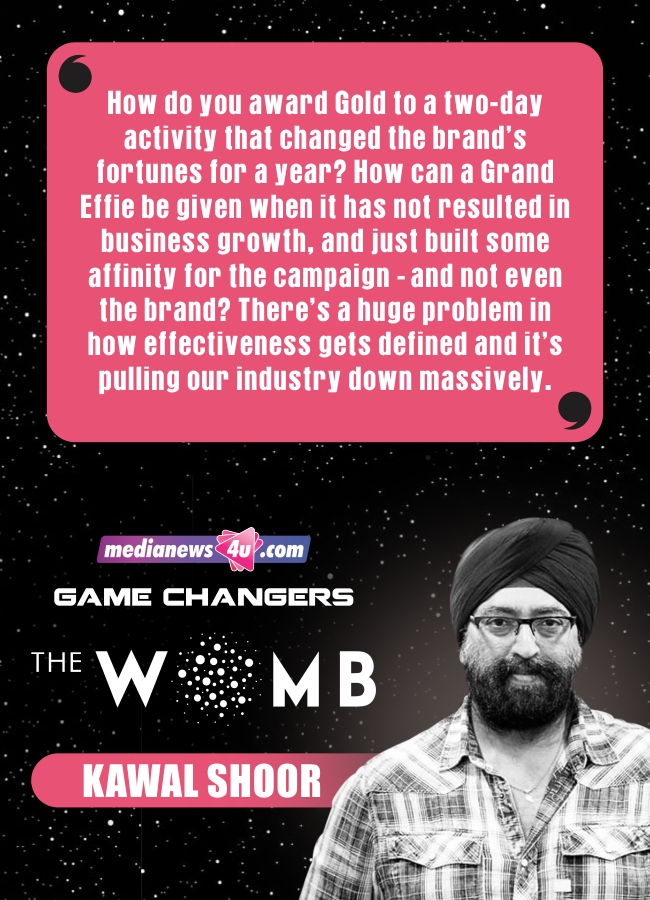
The agency, which claims it has several case studies to enter at the Indian Effies competition, will abstain from doing so this year. It has to do with a difference of opinion on the judging process, which the founders say is not aligned with regional and global Effie competitions. It had been brought to the attention of organisers four years ago but to no avail. Talreja clarifies that this is not a permanent exit from the awards but a statement that was necessitated in the interest of the industry.
Irrespective, the teams will make the case studies. The duo note that there is more to writing case studies than entering awards. It is a part and parcel of learning and that will continue. Just like the quest for good work that works for brands.
“Effies and awards come later. The biggest recognition that we have got is 20-odd clients seeing your work and saying they want to work with you,” surmises Talreja.
Leading the Change
Should there be an organisation that is working on the ground to improve the lives of the disabled, The Womb will work for them free of cost.
And what’s more, the agency leaders promised in the course of this interview that it would not enter such work into award shows.
“We would like to see agencies stop misusing disabled people. If you are not making a material difference to their lives, why are you using them in your work?” asks Shoor, pointing to an unfortunate trend.
“It is below our dignity to take advantage of another’s misfortune. The Womb commits to doing pro bono work for any organisation working for the handicapped. And we will not enter that piece of work in an award show,” underlines Talreja.
The founders are making a statement to usher in the change they want to see.
Much like the work The Womb strives to create, it is simple, but unignorable.

